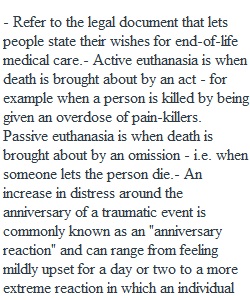


Q Chapter 16 review questions: • What is a living will? • What are the two types of euthanasia? • What is an anniversary reaction? • What is a final scenario? • What is a death doula? • Describe Kübler-Ross’s five stages of dying: denial, anger, bargaining, depression, and acceptance. • Given the highly specific medical criteria for brain death, why do social and cultural definitions of death continue to be used? Previous
View Related Questions